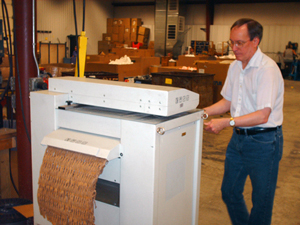
Members | About Workshops | Services for Missourians | News
Dignified and meaningful employment
for people with disabilities

Workshop services provide employment for Missourians and valuable services for local communities.
Frequently Asked Questions About Workshops and Their Services
(Editor's note: This article was written by Larry Young, former director of the Sheltered Workshop Division of the Missouri Department of Elementary and Secondary Education. Although Larry has retired, the article remains valuable.)
What is a sheltered workshop?
Missouri sheltered workshops are different from shops in many other states because they depend heavily on contracted work with business and industry, and the revenue from that work to maintain operations. They are actually small businesses employing individuals with disabilities.
On average, workshop contract revenue accounts for 65% of workshop revenue, state aid 18%, and the balance from grants, donations, etc. Because of the dependency on contract revenue, Missouri workshops readily respond to customer needs relating to quality, and turn-around time. Jobs performed include packaging, assembly, collating, stuffing, and sorting mailings, and products such as pallets, wire spools, first aid kits, poultry watering systems, office products and furniture. Services are also provided by workshops including, janitorial work, grounds maintenance, commercial laundry operations and microfilming Workshops also provide work crews that work in customer facilities.
How are workshops run?
Each workshop is a not-for-profit corporation overseen by a volunteer board of directors. Board members include local business people, educators, lawyers, accountants, and family members of employees. The board determines the long-term goals and objectives for a given shop and hires an operational manager for the day-to-day operations.
How are people paid?
Each workshop has a special certificate from the Department of Labor that allows it to pay a special sub-minimum wage. Workshop employees are paid based on their ability to perform in relation to the performance of a person without a disability. If an employee produces 50% of what a non-disabled person produces, then they receive 50% of what that person is paid. These procedures are checked frequently by the Department of Labor. Labor costs for workshops are the same as any other business. The workshop employee is paid paid the same for their output. It simply takes the workshop employee longer to produce their work.
Can workshops do work for less?
No, not necessarily. Workshops do not receive the same production per person per hour as a business hiring non-disabled workers receives.
For example, say a group of workshop employees produce at a 50% productivity level. If a business in the community produces 1,000 widgets a week employing 25 non-disabled individuals, it will take approximately 50 individuals employed in the workshop to produce the same 1,000 widgets. This means significantly higher costs for supervision and overhead.
Workshops must depend on quality, flexibility, and a large, readily available, workforce to sell their services. What workshops can offer for their customers is a dependable workforce without the headaches of personnel management.
How do workshops obtain business?
Some workshops have their own sales representatives who calls on local businesses to make them aware of the services the workshop can provide. Other workshops have joined together in cooperative arrangements to share sales people, and still others depend on the manager to do the sales work. Much of a workshops business is repeat business, or word of mouth, from satisfied customers.
How many people with disabilities are employed in workshops?
There are 93 workshop corporations located around the state of Missouri. These shops provide employment for approximately 7500-8000 people with disabilities and approximately 900 non-disabled staff.
What kind of disabilities do workshop employees have?
The majority of workshop employees are developmentally disabled. Other common disabilities include mental illness, head injury, blindness, deafness, seizure disorders, and physical disabilities. Prior to being hired for employment in the workshop, people must be assessed by an Extended Employment Certification Specialist who will certify them for employment in the workshop.
What role does the state play?
Other than the fact that the state (Department of Elementary and Secondary Education) provides some funding, oversight, regulations and guidelines for the establishment and operation of sheltered workshops, and some technical assistance when requested, its role is minor in the day-to-day operation of the shops.
What do workshops do for the community?
Besides the obvious, providing employment, especially for people with disabilities, workshops also put money back into the community. Payroll, purchase of goods and services, and participation in community affairs are a couple of ways that workshops contribute to the community. Last year (FY 2001), Missouri workshops paid approximately $107,000,000 back into their communities, providing a significant contribution to the commerce of those communities. What a bargain this is for the state taxpayer, providing nearly a 5:1 return on their investment.
What can a workshop do for business?
Workshops can provide a ready and capable workforce, production space, equipment, and transportation of product. Some businesses turn over their entire operations from receipt of inventory, to customer shipping to the workshop. This provides definite benefits to those businesses in that they are able to concentrate on selling, and not be burdened with a lot of issues like facilities, personnel, overhead burdens (utilities, insurance, etc.). For businesses that have seasonal work, or face the fulfillment of a large order, a workshop can provide the assistance needed. A business wanting to test a new product line that requires special packaging (i.e. shrink, blister pack, or skin pack), many workshops have this equipment available with no capital investment needed by the contracting business.
Businesses and workshops have successfully partnered for more than 35 years now. More businesses should become involved in this dynamic process. Please see the chart on Page 6 detailing the revenue of Missouri workshops.
MASWM The Missouri Association of Sheltered Workshop Managers
If you have questions, please contact:
President Tim Poepsel – (573) 503-0000 or tpoepsel@empacgroupinc.com
or Legislative Chair Kit Brewer – (314) 647-3300 or cbrewer@cuinc.org